Positive outlook for North Macedonia’s housing market
The government’s recent decision to officially change the country’s name from “Macedonia” to “North Macedonia” under the name deal with Greece solved the long-standing dispute between the neighboring countries and opens the way for NATO and EU integration. This, in effect, is expected to support the country’s long-term economic growth and political reforms.
“The Republic of North Macedonia will have huge economic benefits from the deal that I believe will be seen in every area of the economy,” said Prime Minister Zoran Zaev. “Big companies with billions in annual revenues are coming.”
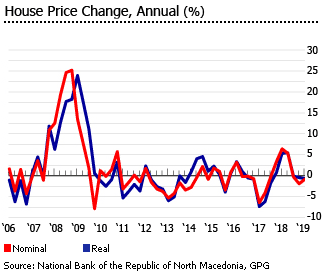
The housing market, which has been sluggish since the global crisis, is expected to be one of the major beneficiaries.
After house price rises of 10.9% (11.8% inflation-adjusted) in 2007 and 25.2% (18.2% inflation-adjusted) in 2008, Macedonia’s housing market has shown unimpressive performance since, mainly due to the global financial meltdown, the problems with neighboring Greece, and its own extended political crisis exacerbating the situation. In 2018, house prices remained 10% down from the peak levels seen in 2008.
HOUSE PRICE INDEX, ANNUAL CHANGE (%) |
||
| Year | Nominal | Inflation-adjusted |
| 2007 | 10.87 | 11.84 |
| 2008 | 25.16 | 18.23 |
| 2009 | -7.84 | 0.61 |
| 2010 | 5.75 | 3.26 |
| 2011 | -1.43 | -3.61 |
| 2012 | -3.74 | -3.18 |
| 2013 | -3.40 | -1.59 |
| 2014 | -0.85 | 1.10 |
| 2015 | 0.93 | 0.68 |
| 2016 | -0.72 | -0.82 |
| 2017 | 3.35 | 0.73 |
| 2018 | -1.90 | -0.44 |
| Sources: National Bank of the Republic of North Macedonia, Global Property Guide | ||
During the year to Q1 2019, the nationwide house price index fell by 0.84% (-0.65% inflation-adjusted), according to the National Bank of the Republic of North Macedonia, the country’s central bank. Quarter-on-quarter, house prices increased 1.9% (1.4% inflation-adjusted) during the latest quarter.
By European standards North Macedonia is a poor country, with a total population of about 2.1 million people and a GDP per capita of US$ 6,100 in 2018. Corruption is rife, with ruling party cronies controlling most businesses. There is much emigration. A large proportion of the population lives in poverty, especially ethnic Albanians who are simultaneously derided as "lazy" and discriminated against.
In an effort to increase homeownership, the government has raised its subsidies for homebuyers to 75% of the monthly bank mortgage (from an initial 50%) for new flats and houses costing under €900 per sq. m. for the first five years. This means that for a flat with an average price of MKD 3.12 million (US$ 56,516), the government will pay a total of MKD 937,331 (US$ 16,980) through subsidies.
Foreign individuals can freely buy apartments and buildings, subject to the reciprocity rule and approval from the Ministry of Justice.
Foreign citizens and companies can directly own land for construction in Macedonia, under the Law on Construction Land adopted in 2008. Under the law, the construction land is sold through a public tender procedure. Also, foreign individuals and companies can lease land for up to 99 years through a public bidding process.
North Macedonia’s economy expanded by a modest 2.7% in 2018, a sharp improvement from 2017’s almost zero growth but at par with the annual average growth rate of 2.6% from 2010 to 2016, thanks to strong consumption and net exports, as well as recovering investment. The economy is expected to strengthen further this year, with a GDP growth rate of 3%, according to the International Monetary Fund (IMF).
After several years of continuous political crisis, the country’s situation has improved remarkably, after a new government was finally formed in May 2017, with centre-left Social Democratic Union’s leader Zoran Zaev as the country’s new prime minister.
Zaev promised to boost the economy, address political divisions and tense relations between ethnic Macedonians and ethnic Albanians in the country, and finally resolve the country’s dispute with Greece over its name – a vital step for Euro-Atlantic integration. As a result, a new agreement with Greece on the issue of its name was reached in June 2018, paving the way for the country to start accession talks with NATO and the EU.
House price variations
In 2018 the average dwelling price in Macedonia was MKD 43,155 (USD782) per square metre (sq. m.), according to the State Statistical Office.
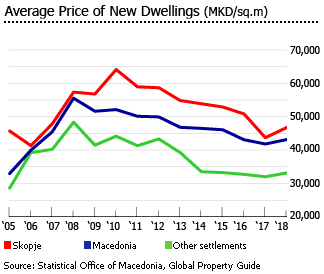
Over the same period:
- In Skopje, the average price of dwellings was MKD 46,764 (USD 847) per sq. m. in 2018.
- House prices in other parts of Macedonia was more than 23% lower than the national average, at MKD 33,157 (USD 601) per sq. m. in 2018.
Residential construction activity
During 2018, the number of dwellings for which permits were issued in Macedonia fell by 8.7% y-o-y to 7,248 units, according to the State Statistical Office. This was in sharp contrast with annual growth of 1.3% in 2017, 26.9% in 2016, 13.2% in 2015 and 14.3% in 2014.
The East registered the biggest decline in dwelling permits of 79.6% during 2018, followed by the Northeast (-79.5%), Polog (-38.4%), Vardar (-34.4%), Pelagonija (-33%), and Southeast (-11.3%). Only Skopje and Southwest saw annual increases of 11% and 32%, respectively.
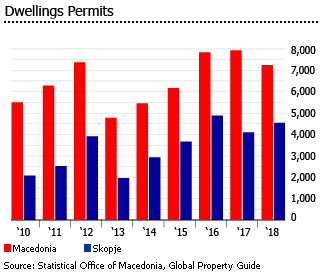
Skopje, the capital, accounted for almost two-thirds of all residential construction activity in the country last year.
During the first two months of 2019, dwelling permits in Macedonia rose by 10.7% to 933 units compared to the same period last year.
Interest rates remain low
The National Bank of the Republic of North Macedonia cut its key interest rate to a record low of 2.25% in March 2019, citing a lack of inflationary pressures as the main reason.
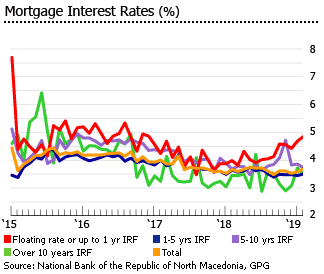
In February 2019, average interest rates for new denar-denominated housing loans was 3.68%, almost unchanged from the previous year’s 3.67%, according to the central bank.
Over the same period:
- Floating rate, or up to 1 year initial rate fixation (IRF): 4.85%, up from 3.98% a year earlier
- 1-5 years IRF: 3.5%, down from 3.64% a year earlier
- 5-10 years IRF: 3.73%, slightly up from 3.68% a year ago
- Over 10 years IRF: 3.49%, slightly up from 3.46% a year earlier
On the other hand, the average interest rate for new euro-denominated housing loans fell to 3.07% in February 2019, down from 3.6% the previous year.
- Floating rate or up to 1 year IRF: 3.87%, up from 3.23% a year earlier
- 1-5 years IRF: 2.86%, down from 3.55% a year earlier
- 5-10 years IRF: 4%, down from 4.11% in the previous year
- Over 10 years IRF: 4%, down from 4.43% a year earlier
Interest rates for outstanding housing loans are falling. In February 2019, the average interest rate for denar-denominated loans fell to 4.4% (from 4.53% a year ago) and to 4.28% (from 4.47% a year ago) for euro-denominated loans.
Mortgage market growing strongly
Loans for house purchases increased 13.6% y-o-y in March 2019 to MKD 46.48 billion (USD 842 million), according to the National Bank of the Republic of North Macedonia. About 95.6% were denominated in foreign currency while the remaining 4.4% were in domestic currency.
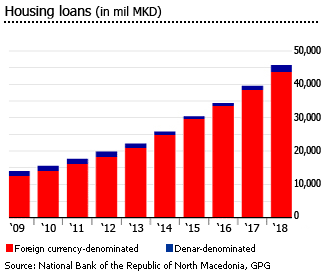
In March 2019:
- Denar-denominated housing loans more than doubled to MKD 2.43 billion (USD 44 million)
- Foreign currency-denominated housing loans rose by 11% y-o-y to MKD 44.05 billion (USD 798 million)
From 2010 to 2018, the total value of housing loans rose by an annual average of 14%. As a result, the mortgage market expanded to about 6.9% of GDP in 2018, more than double its size a decade ago.
Rental yields are moderate
Gross rental yields on apartments in Skopje range from 5% to 5.6%, according to Global Property Guide research. Smaller apartments have better yields than bigger counterparts. Apartments can be rented out for around US$ 5.3 to US$ 5.8 per sq. m.
There is no rent control in Macedonia; rent is determined by the market.
Modest economic performance; falling unemployment
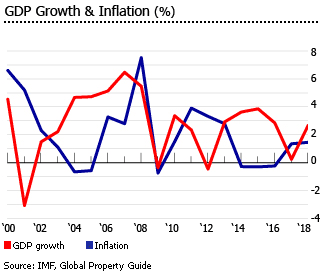
North Macedonia expanded by a modest 2.7% in 2018. The economy is expected to strengthen further this year, with projected GDP growth rate of 3%, according to the International Monetary Fund (IMF).
Unemployment continues to fall, although it is very high by international standards.
In 2018, unemployment fell to a record low of 19.4%, from 22.4% in 2017, 23.8% in 2016, 26% in 2015, 28% in 2014, 29% in 2013 and 31% in 2012, according to the IMF. Most of the new jobs created last year were in manufacturing, wholesale and retail trade, and industries closely related to tourism.
Macedonia’s jobless rate is expected to fall further to 18.9% this year.
Inflation stood at 1.4% in March 2019, up from 1.1% in February and 1.2%, according to the State Statistical Office. Inflation is expected to accelerate to 1.8% this year and 2% in 2020, up from 1.5% in 2018, according to the IMF.
Political climate improving; EU and NATO accession underway
In recent years the country has been in a state of continuous crisis, after then Macedonian opposition leader, Zoran Zaev, released what he has called information “bombs” against the government.
Zaev accused the former government of systematically wiretapping all important people in the country, and released a series of allegedly wiretapped conversations of the then-prime minister, Nikola Gruevski, the head of the secret service and other senior officials, in which they apparently discussed interference in the judiciary, media and urban-planning process.
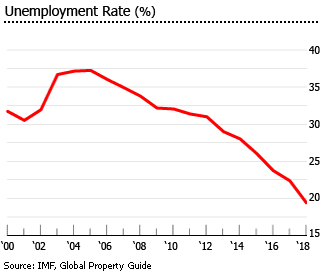
Zaev claimed that the elections of April 2014, in which the ruling conservative VMRO-DPMNE party of Gruevski defeated Zaev’s ex-communist Social Democrats (SDSM), were fraudulent and has accused Gruevski of operating a dictatorship. Zaev’s party tends to represent ethnic Albanians.
Gruevski, who had been prime minister since 2006, resigned in January 2016 to pave the way for early elections, initially scheduled for February before being postponed until June 5, and finally to December 2016. A highly controversial presidential amnesty for 56 of those subject of investigations into the alleged wiretappings was issued by president Gjorge Ivanov, with the obvious intention of aborting the judicial investigations and hiding any evidence.
Mass protests erupted in Skopje. Zaev and 10 other politicians who have received amnesties have refused them, and foreign institutions have condemned them.
The December 2016 general elections failed to produce an outright winner and months of tension over the formation of a new government ensued.
Finally in May 2017, a new government was formed, with Zoran Zaev as the country’s new prime minister. Zaev promised to boost the economy, address political divisions and tense relations between ethnic Macedonians and ethnic Albanians in the country, and finally resolve the country’s dispute with Greece over its name – a vital step for Euro-Atlantic integration.
A dispute with Greece over Macedonia’s name had blocked the country’s accession to European Union (EU) and North Atlantic Treaty Organization (NATO). However the change of government has changed the picture, with PM Zaev indicating Macedonia´s willingness to compromise to resolve the issue. Last year, PM Zaev announced that Skopje’s airport will no longer bear the name Alexander the Great nor will the motorway leading to Greece, which now be called as Friendship Highway.
Then in June 2018, the government decided to enter into a new agreement with Greece – officially changing its name from “Macedonia” to “North Macedonia” to resolve the decades-long name dispute, paving the way for the country to start accession talks with NATO and the EU.
Sources:
- Basic Economic Data and Residential Real Estate Prices (National Bank of the Republic of North Macedonia): http://www.nbrm.mk/osnovni_ekonomski_pokazateli-en.nspx
- Average prices of residential dwellings contracted for construction per 1 m2, in denars, by years (State Statistical Office): http://makstat.stat.gov.mk/PXWeb/pxweb/en/MakStat/MakStat__Ceni__IndeksTrosGradeznistvo__CeniStanovi/125_GradMkCeniStanoviM2_en.px/table/tableViewLayout2/?rxid=46ee0f64-2992-4b45-a2d9-cb4e5f7ec5ef
- World Economic Outlook Database (International Monetary Fund): https://www.imf.org/external/pubs/ft/weo/2019/01/weodata/index.aspx
- Construction (State Statistical Office): http://www.stat.gov.mk/OblastOpsto_en.aspx?id=20
- Monetary Statistics (National Bank of the Republic of North Macedonia): http://www.nbrm.mk/monetarna_statistika-en.nspx
- Macedonian central bank lowers benchmark interest rate to 2.25% (Financial Observer): https://financialobserver.eu/recent-news/macedonian-central-bank-lowers-benchmark-interest-rate-to-2-25/
- Macedonia: yields are moderate (Global Property Guide): https://www.globalpropertyguide.com/Europe/Macedonia/Rental-Yields
- IMF raises N. Macedonia’s 2019 GDP growth forecast to 3.0% (See News): https://seenews.com/news/imf-raises-n-macedonias-2019-gdp-growth-forecast-to-30-650140
- Macedonia inflation rate (Trading Economics): https://tradingeconomics.com/macedonia/inflation-cpi
- North Macedonia profile – Timeline (BBC News): https://www.bbc.com/news/world-europe-17553072
- Fitch gives Macedonia positive outlook as politics stabilize (BNE Intellinews) https://www.intellinews.com/fitch-gives-macedonia-positive-outlook-as-politics-stabilise-155006/
- Macedonia officially changes its name to North Macedonia (BNE Intellinews): https://www.intellinews.com/macedonia-officially-changes-its-name-to-north-macedonia-156311/
- North Macedonia: A Name Agreement in the Age of Nationalism (The National Interest): https://nationalinterest.org/feature/north-macedonia-name-agreement-age-nationalism-44557
- Macedonia: Why the row with Greece over the name runs so deep (BBC News): https://www.bbc.com/news/world-europe-42963058
- Greek and North Macedonian Prime Ministers Pose For Historic Selfie After End To 30-Year-Long Name Dispute (Time): http://time.com/5562608/greece-macedonia-prime-minister-selfie-name-dispute/
- ‘Big Greek companies’ coming to N. Macedonia after name deal: PM Zaev (France 24): https://www.france24.com/en/20190401-big-greek-companies-coming-nmacedonia-after-name-deal-pm-zaev